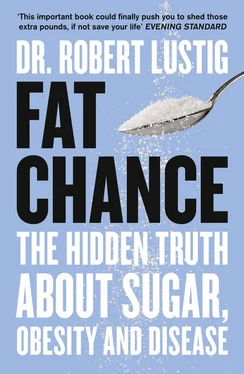The concept of personal responsibility for obesity doesn’t always make sense. In our society today, one has to ask: Are there people who see obesity as a personal advantage? Something to be desired or emulated? Across the board, modern Western societies today value the thin and shun the obese. Obesity frequently comes with many medical complications, and those afflicted are more likely to develop heart problems and type 2 diabetes (see chapter 9). Obese people spend twice as much on health care. [12] D. Thompson et al., “Lifetime Health and Economic Consequences of Obesity,” Arch. Int. Med. 159 (1999): 2177–83.
Studies show that the obese have more difficulty in dating, marriage, and fertility. The obese tend to be poorer and, even in high-paying jobs, earn less than their peers. [13] J. Bhattacharya et al., “Who Pays for Obesity?” J. Econ. Perspect. 25 (2011): 139–58.
Now ask the same question about children. Did Sienna see obesity as a personal advantage? Did she become obese on purpose? Obese children have a quality of life similar to that of children on cancer chemotherapy. [14] J. B. Schwimmer et al., “Health-Related Quality of Life of Severely Obese Children and Adolescents,” JAMA 289 (2003): 1813–19.
They are ostracized by their peers and are the targets of bullies. Many obese children suffer from low self-esteem, shame, self-hatred, and loneliness. One study showed children pictures of potential playmates. Each looked different and some had physical handicaps, such as being deformed or in a wheelchair. The researchers asked the children with whom they would rather play. The obese child came in dead last. Clearly, obesity is not something to which people, especially children, aspire.
However, this view of obesity does not necessarily square with the beliefs of obese people themselves. They see themselves as perpetrators, not victims. They often state that they know their behavior is out of control and that this behavior is their own fault. They frequently experience yo-yo dieting. They lose weight for a period of time, and when they gain it back they blame themselves, seeing the gain as a character failing. They often recount binge eating, which suggests that a degree of dietary control is lost. These experiences of losing control make them think they had the control in the first place. Did they?
2. Diet and Exercise Don’t Work
If obesity were only about increased energy intake and decreased energy expenditure, then reducing intake (diet) and increasing expenditure (exercise) would be effective. If obesity were caused by learned behaviors, then changing those behaviors would be effective in reversing the process and promoting weight loss. Specific and notable successes have led to behavior/lifestyle modification as the cornerstone of therapy for obesity.
There are the anecdotal cases of weight loss by celebrities, such as Kirstie Alley or Oprah Winfrey, who publicly endorse their diets as if they were the latest fashionable handbags. They share their stories on TV and convince their viewers that this lifestyle change is possible for them, too, and that, as with adding the newest fall color to their wardrobe, losing weight will make them attractive and happy. There are reality television shows, such as The Biggest Loser , that document the weight loss (along with many a meltdown) of “normal people” through controlled diet and exercise. Publicity, cash prizes, and constant attention are often enough to change one’s diet and exercise response for a short time. In any magazine and many infomercials, peddlers of new weight-loss remedies provide before and after pictures of people who have lost 100 pounds.
Whether this constitutes a true lasting change in behavior is doubtful. After all, Kirstie Alley and Oprah, celebrities who live in the public eye, have gained their weight back several times (until their newest miracle diet began, countless new diet books were sold, new gurus were anointed, millions of dollars were made, and the cycle repeated itself). There have been numerous reports of contestants on The Biggest Loser regaining much of their weight after the show ended. Most notably, Eric Chopin, the Season 3 winner, appeared on Oprah to tell his sorry tale of gaining at least half the weight back after his victory. He wrote in one blog post, “I’m still not back on track totally. I don’t know what it is.” Significant weight regain has been seen in up to one third of patients who have had surgery for weight loss (see chapter 19), because the reason for the obesity is still there. Unless it’s dealt with directly, regaining will be the norm, not the exception.
Strict control of one’s environment through limiting caloric intake and increasing physical activity can result in weight loss. This is true as long as the environment remains regulated. A perfect example is the army recruit who consistently loses weight due to monitored diet and vigorous exercise. This also accounts for the number of “fat schools” and “fat camps” that have sprung up nationwide. Parents send their overweight child away for the summer and are thrilled when he returns thinner, if harboring parental resentment. There are numerous reports of Hollywood stars who bulk up for a role (remember Robert DeNiro in Raging Bull ?) and then lose the excess weight after shooting. (Of course, they have the benefit of round-the-clock personal trainers and nutritionists to monitor their food intake.) While such results are dramatic, they usually cannot be sustained. Environmental control is different from behavioral control (see chapters 17 and 18).
The real problem is not in losing the weight but in keeping it off for any meaningful length of time. Numerous sources show that almost every lifestyle intervention works for the first three to six months. But then the weight comes rolling back. [15] T. A. Wadden et al., “Treatment of Obesity by Very Low Calorie Diet, Behavior Therapy, and Their Combination: A Five-Year Perspective,” Int. J. Obes. 13 (1989): 39–46; M. W. Schwartz et al., “Regulation of Body Adiposity and the Problem of Obesity,” Arterioscler. Thromb. Vasc. Biol. 17 (1997): 233–38.
The number of people who can maintain any meaningful degree of weight loss is extremely small (see figure 3.1). However, because behavior/lifestyle modification is the accepted treatment, the general explanation of weight regain is that it is the individual’s fault. Because he is “choosing” not to live a healthy lifestyle, the doctors and the insurance industry do not feel it their responsibility to intervene.
The same is true for children. Due to some notable and individual successes, behavior/lifestyle modification is the cornerstone of therapy. However, this is not a winning strategy for most obese children. Research shows that dietary interventions don’t often work. Exercise interventions are even less successful. And unfortunately for children like Sienna, at one year of age they are unable to run on a treadmill. Also, the effects of altering lifestyle for obesity prevention are underwhelming and show minimal effect on behavior and essentially no effect on BMI.

Fig. 3.1. The “Biggest Loser”—Not You.Percentage of obese individuals who were able to maintain their weight loss over nine years.
3. The Obesity Epidemic Is Now a Pandemic
If obesity were just an American phenomenon it would be an epidemic, an outbreak of illness specific to a certain area. One might then blame our American culture for promoting it. Due to our slippage in education and technological superiority, we’re labeled as “fat and lazy” or “gluttons and sloths.” Yet obesity is now a pandemic , a worldwide problem.
Читать дальше













